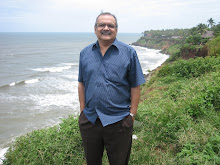As the Finance Minister Pranab Mukherjee rose to present the Budget in Parliament at 11a.m on the 6th of July,2009, the stock market shot up in hope and expectations. 90 minutes later, when he was winding up his Budget speech, the Market fell by more than 5%- the biggest fall ever on a budget day-. An analysis of the Budget would reveal that it is a well balanced budget aiming for growth through increased expenditure and satisfying the social sectors as promised in the UPA's manifesto.
Then why did the market tank? Firstly, the market movement should not be taken as a yardstick to judge the overall budget. Probably a lot of hype was built around this budget by the media stating it to be the "Big Budget" especially after the ease with which the Congress won the Elections.The media made it look that without the "Left party", there was no hurdles left. The Economic survey report which was tabled a couple of days prior to the Budget day did not help matters as it laid out a grand vision for India but without any time frame or road map.
The Budget per se tried to increase domestic demand by putting money in the hands of the rural people and allocating spends on Infrastructure. The NREGA scheme(National rural employment guarantee scheme), abolition of Surcharge in income tax, abolition of the fringe benefit tax etc.. would create wealth in the hands of the people and would increase spending. For the first time, the Budget provides for Rs ten lakh crores(Rs 10 trillion) expenditure. The revenues at Rs six lakh crore(Rs 6 trillion) makes the Fiscal deficit at 6.8% of the GDP( Rs.58 trillion). This obviously is a huge figure which is to be made up by borrowings.
Certain facts emanate out of this deficit. The huge borrowings would push the Bond yields up and the interest rates to harden. With the Government borrowing so much , will it elbow out the private sector borrowings? The growth can never fructify without the private sector participation. The government's stated policy is also to go in for public-private sector partnership(PPP).
It was also praiseworthy that the Finance minister did not take the retrograde step of rolling back the excise duty cuts he unfolded just prior to the elections as part of the economic stimulus package. What was missing was a clear road map for disinvestment in PSU's and the participation of FDI's(Foriegn direct investment) in Banking and Insurance sectors. One is pretty sure the Government would go in for disinvestment to raise the necessary fund but Pranab Mukherjee could have articulated this better.
Of course, the choice before the Finance Minister was to either please the FII's(Foriegn Institutional investors) with deep pockets or the 1.2 billion Indians. The Minister chose the latter and rightly so.
Thursday, July 9, 2009
Budget India 2009-10
Posted by
the kasl
at
11:26 AM
0
comments
![]()
Tuesday, July 7, 2009
Roger Federer creates history
July 5, 2009 and history was created at Wimbledon when Roger Federer went past Pete Sampras' record of 14 Grand slam titles. For a fleeting moment after the 2008 Wimbledon loss to Nadal and during the earlier part of this year, Federer had this strange churn in his stomach that he might have met his nemesis. He took a break from the game to get over his back problem and came back all the more stronger to win his first French open title which he was craving for. He had to prove it more to himself that he could win in all types of surface.
15 Grand slams titles, 20 Grand slam finals, 80% all time win record. What else can one do better? Looks virtually impossible for anyone to match this performance, let alone surpass it and mind you, he is still not through yet. The statistics by themselves are mind boggling but even for a purist, Roger stands out as the best the game has ever produced. The grace, elegance and poise he brings to the game- both on and off the court- can hardly be matched. He demolishes his opponents with such grace that they hardly seem to notice it and more so don't seem offended by the ease with which it is mostly done.
The moment he won the French open, the arguments on who is the best ever tennis player ceased to exist. It is almost as if God created him to embody all that tennis is. The greatness in his play is how he positions himself to play the stroke. In that remains the secret of his success.
Andy Rodick was the most unfortunate person on July 5, 2009. He played a game of his lifetime. Actually, he was better than Federer that day but it was not his day. Federer had a date with history and the Lord of grass made it his own.
Posted by
the kasl
at
2:47 PM
1 comments
![]()
